Guide To Eating for Acne-Free Skin
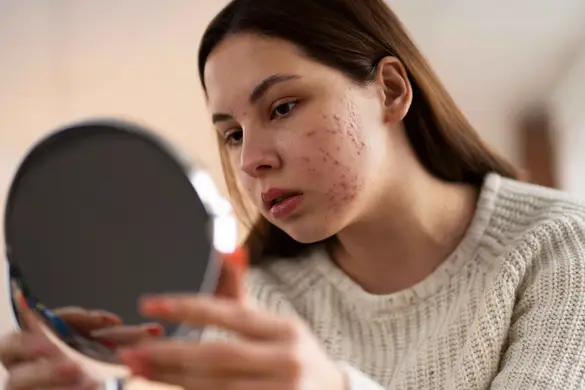
Guide To Eating for Acne-Free Skin
Posted on 17th Apr, 2025
Who doesn't want healthy, clear skin? While genetics plays an important role, the skin is equally affected by diet and lifestyle. Most of our acne results from what we eat, if we have food sensitivities or unhealthy habits that trigger acne breakouts.
Yet, we often try to hide our skin issues with topical products, which only amplify the problem. The better solution? Focus on elevating food habits and making mindful lifestyle changes. In this guide, we will discuss how diet affects your skin and a simple acne diet plan to help you achieve smooth, youthful skin.
Does Food Really Elevate Acne Problem?
Yes, and here's why.
Acne begins when hair follicles get clogged with oil, dead skin cells, or bacteria. This process is made worse when the body produces excess sebum, a natural oil meant to keep your skin from drying out. The result? Inflammation, pimples, and skin irritation.
Now, certain foods particularly those having high glycemic index and high glycemic load, such as carb-rich foods, can increase insulin and insulin-like growth factor 1 (IGF-1) levels. The high levels of IGF-1 are known to stimulate sebum production, making acne worse.
In short, food choices have a great impact on your skin. Let’s look at foods to avoid and include to keep acne away and get clearer skin.
Foods to Avoid to Prevent Acne
While diet is not the sole reason causing acne, avoiding triggering food and habits may prevent breakouts and protect you from various skin problems, making your skin smooth.
1. Sugary and High-Glycemic Foods
Foods, such as soda, white bread, white rice, and sweets, quickly raise blood sugar levels, leading to increased insulin levels. This, in turn, increases sebum production and triggers breakouts.
2. Dairy Products
Milk, particularly skim milk and whey products, may boost insulin levels independently of their sugar content. Therefore, try taking dairy products in moderation.
3. Processed and Fried Foods
French fries, potato chips, pastries, and bakery products are so tempting and irresistible but high in unhealthy fats, sugars, and salts. It contributes to clogged pores, acne production, and inflammation.
4. Caffeine
Coffee contains caffeine which can raise cortisol (a stress hormone), leading to increased oil production, clogging the pores, and forming acne. When mixed with sugar, milk, or cream, it can cause insulin spikes, and worsen acne breakouts.
5. Alcohol
Most alcoholic beverages are high in sugars and are diuretic. It can cause insulin spikes, fluid loss, and skin dehydration making skin more prone to breakouts.
6. Food Sensitivities
Certain foods may not suit everyone. If you have sensitivities, your immune system may trigger inflammation in response, which can show up on your skin as acne.
Best Foods for Acne-free Skin
Now that we know what to avoid to get acne-free skin, let’s focus on food that we can include for healthy skin.
1. Vegetables and Fruits
Leafy Greens: Leafy greens such as spinach, kale, amaranth, and other greens are rich in antioxidants, vitamins A, C, K, Folate, and other nutrients. These nutrients help detoxify the body, reduce inflammation, calm down redness, and reduce sebum production, all of which contribute to acne production.
Berries and Citrus Fruits: Strawberries, oranges, blueberries, amla, lime, and kiwi, are loaded with antioxidants and help combat acne-causing bacteria. Few berries also contain salicylic and alpha-hydroxy acids which help exfoliate dead skin cells and unclog the pores.
2. Healthy Fats and Proteins
Avocado: Enriched with healthy fats, antioxidants, and antimicrobial effects. Avocados prevent skin from breakouts, keep it hydrated, and reduce skin inflammation.
Nuts and Seeds: Almonds, peanuts, chia seeds, flax seeds, pumpkin seeds, and walnuts are great sources of omega fatty acids and vitamin E. These help keep skin hydrated and balance oil production to prevent acne.
Omega-3 Sources: Fatty fish like salmon, and plant-based sources such as flaxseeds and chia seeds, are excellent sources of Omega-3s. One can also add fish oil or plant-based supplements to fulfill the requirements of healthy fats. These sources are also rich in anti-inflammatory properties to keep the inflammation in check.
3. Herbs, Spices, and Beverages
Turmeric and Garlic: Both food items offer anti-inflammatory and antibacterial benefits and help regulate sebum production, improve blood circulation, and fight acne-causing bacteria.
Green Tea: Green tea has polyphenols and anti-inflammatory, anti-microbial, and antioxidant properties. It soothes irritated skin, reduces sebum production, and prevents acne breakouts.
Probiotics: The unhappy gut health affects skin through acne breakouts and pimples. But when the gut microbiome is imbalanced, it can trigger systemic inflammation, one of the root causes of acne. Probiotics help restore the balance of good bacteria in the gut, which regulates inflammation and immune responses. Curd, buttermilk, and fermented foods are the best sources of probiotics (gut bacteria) which may help fight acne-causing bacteria and reduce inflammation to prevent acne.
Read more: A Comprehensive Guide on How To Improve Gut Health
Anti-Acne Diet Plan
A diet plan isn't always one-size-fits-all, it needs understanding your body, tracking patterns, and making consistent, informed choices. Below we are sharing the best suitable approaches for acne-free skin and a diet plan to help guide your anti-acne journey:
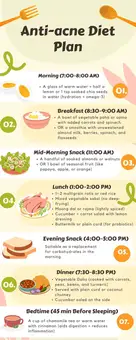
Dietary Approaches That May Help
1. Paleolithic (Paleo) Diet
Based on lean meats, fruits, vegetables, and nuts, while excluding dairy, grains, and processed foods. This diet helps reduce high-glycemic and insulin-spiking foods, which are known to stimulate sebum production and worsen acne.
2. Mediterranean Diet
Rich in vegetables, fruits, whole grains, legumes, fish, and olive oil, this anti-inflammatory diet supports balanced hormones. It is linked to lower acne severity, thanks to its antioxidant and omega-rich profile.
Final Thoughts
Clear skin is not only about what you put on your face but it’s more about what you put on your plate. The first step to prevent acne breakout should be reducing foods that trigger inflammation and increasing your intake of skin-friendly nutrients. Keep yourself hydrated, track how your skin responds, and consult a dermatologist or nutritionist if needed.

Health articles from our experts
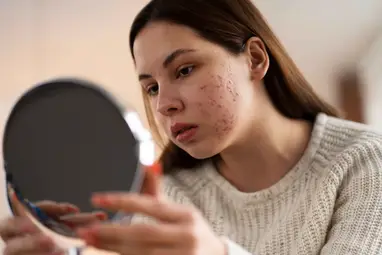
Guide To Eating for Acne-Free Skin
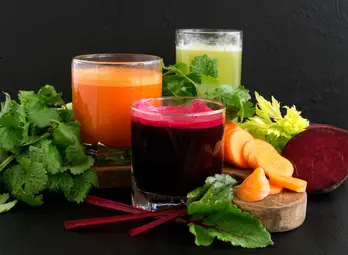
Revitalize your Dull Skin with Amla and ABC Juice
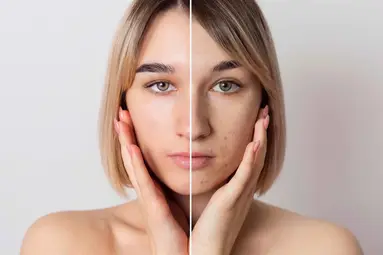
A Comprehensive Guide On How To Reduce Pigmentation
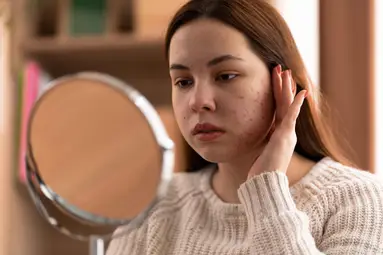
A Comprehensive Guide To Prevent Acne
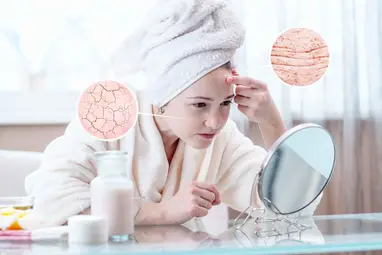
Skincare Tips for Different Seasons - Adapting Your Routine to Weather Changes

CoQ10 for Skin: Benefits & Ways to Use It

5 Best Benefits Of Ashwagandha For Skin

10 Foods Rich In Glutathione
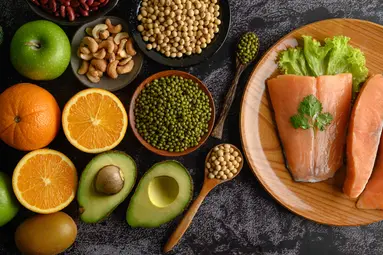
12 Best Collagen-Rich Food

